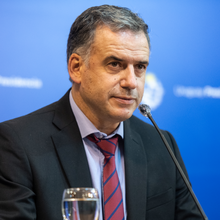On November 24, Uruguay reaffirmed its democratic commitment by electing Yamandú Orsi as president in a runoff election, marking the return of the Frente Amplio to power after five years of National Party rule. Orsi, who secured 49.8% of the votes compared to Álvaro Delgado’s 45.9%, will assume leadership in a country known for its institutional stability and political polarization. This victory represents a significant shift in Uruguay’s political landscape, reestablishing the left’s leadership in the nation.
In his speech following the results, Orsi emphasized the need for national unity. “There is another part of our people who today feel differently; we need them too”, he stated, highlighting the importance of including all voices in his administration. He also stressed the value of political consensus: “There is no future if we build walls around ideas”. These remarks reflect his intention to promote a dialogue-driven agenda, a crucial approach given that his coalition lacks a parliamentary majority—an unprecedented challenge for the Frente Amplio.
The president-elect’s agenda includes ambitious proposals, such as creating a more effective system to combat drug trafficking, recruiting 2,000 new police officers, and reforming social security to lower the retirement age to 60. Additionally, Orsi has emphasized that his administration will not implement tax increases, aligning with a pragmatic approach to strengthen the economy and maintain public trust.
At the regional level, Orsi’s victory reinforces the dominance of left-leaning governments in Latin America, contrasting with the ultraliberal approach of Argentina’s President Javier Milei. The ideological differences between the two leaders could impact bilateral relations, particularly in areas such as trade and regional integration. However, Orsi’s leadership also presents an opportunity to reaffirm Uruguay’s role as a bridge between diverse political currents in the region.
The government transition is unfolding in a climate of institutional respect. Outgoing President Luis Lacalle Pou congratulated the president-elect and extended an invitation for him to attend the upcoming Mercosur summit in December. This gesture, along with the early acknowledgment of Orsi’s victory, underscores Uruguay’s robust democracy, a country that remains a beacon of moderation and stability in the region.
